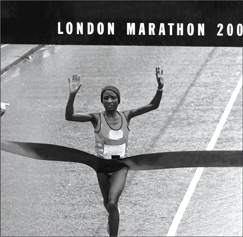Biology & Society
Head for the Hills?
The Miami soccer coach was upset. The Denver team was tops in the league. But his players were well-trained—and several had still collapsed from fatigue in the second quarter. He knew that “the mile-high city” was aptly named: its air was less dense than his players were accustomed to. But he'd flown his team in three days early. Why didn't that help? He decided to do some research.
He learned that the lower air density in Denver means that every breath has 15 percent less oxygen than it has at sea level. This means that there is less oxygen for the lungs and blood to deliver to muscles. Less oxygen decreases the performance of muscles that work for long periods. The body can adapt to altitude, but it takes about a week—so his strategy of arriving three days early fell short.
High-altitude adaptation includes an increase in the lung's ability to get oxygen into blood, as well as an improvement in the ability of muscle cells to use oxygen. The body's production of active red blood cells also increases, stimulated by low oxygen availability. So people who live or train at high altitudes have an advantage over “flatlanders.” This information helps explain why runners from places like Nairobi, Kenya (altitude 5450 feet), compete so well in endurance events.
High-Altitude Training Should Not Be Restricted Several training regimes legally use the effects of altitude to maximize performance. Some coaches have their players live or train at high altitude. Other players sleep in special tents whose air contains less oxygen. So even teams that live at low altitudes can mimic the effects of high altitude in their training. These techniques cause a natural increase in the body's production of the hormone erythropoietin (EPO), which stimulates the production of red blood cells that carry oxygen.

Elite marathoners, such as this Kenyan runner, often live and/or train in high-altitude areas.
High-Altitude Training Should Be Restricted The injection of extra EPO during training—a biotech method of what is called “blood doping”—is illegal. High-altitude training regimes are just a “natural” way to accomplish exactly what blood doping does. It is unfair and possibly unsafe.
Research and Decide
Analyze the Viewpoints Using the Internet, research high-altitude training and “blood doping.” Compare and contrast the effects of high-altitude training regimes with the effects of blood doping.
Form an Opinion Are current regulations fair to athletes from low-altitude states and countries?
Table of Contents
- Formulas and Equations
- Applying Formulas and Equations
- Mean, Median, and Mode
- Estimation
- Using Measurements in Calculations
- Effects of Measurement Errors
- Accuracy
- Precision
- Comparing Accuracy and Precision
- Significant Figures
- Calculating With Significant Figures
- Scientific Notation
- Calculating With Scientific Notation
- Dimensional Analysis
- Applying Dimensional Analysis




